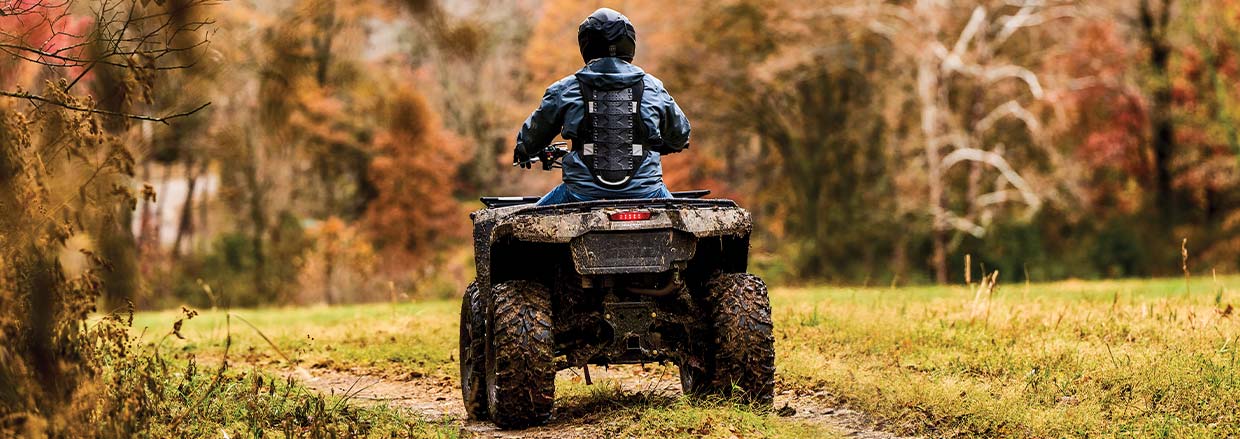Safety & Resources

ATV & UTV Safety: Know Your Gear
Outdoor adventures come with a safety tag and off-roading is no different. Whether you are navigating through rugged terrains or tending your farm, have your protective gear on. As an off-road rider, you are constantly exposed to various hazards like insects, mud, gravel, wires, lines and overhead branches. Here’s a list of things you need to consider to keep on you at all times.

- Helmet: A certified helmet such as DOT, Snell and ECE are legally acceptable in Canada. A good helmet that fits snugly and fastens securely is just as important as wearing your seat belt in a car.
- Apparel: Keep your hands protected with padded gloves, shield your eyes with scratch-resistant goggles and opt for footwear with good footing and ankle protection to prevent bruising from flying debris like gravel, wires, and branches. Wear lightweight clothing that shields your body from the sun and covers you completely.
- GPS & Communications: When off-roading, having GPS is advisable as your mobile device’s coverage can be spotty. Pre-load your maps before heading to your location for hiking or hunting. Also, Bluetooth radio will help you communicate with other riders easily and make a distress call if needed.
- First-aid kit: Always carry a general emergency first-aid kit (Emergency Kit - CAA National) with you while riding your off-road vehicle. Make sure you stock up on items that can treat common injuries.
- Gear bag: Gear bags designed for hauling are helpful for your all-day chores. They allow you to carry your toolkit, emergency goods, and essentials while protecting your gear and gadgets.
DY Hunting Apparel, Communication Devices, GPS, Gear Bag - WIDGET
Off-Road Trail Etiquette

Follow expert Leo Stakos as he guides us through off-roading, including trail etiquette, key safety tips, and much more.
5 Tips for Responsible Off-Roading
Let’s get real: Off-roading is no average sport. Although there is no standardized rule book or official training camp, off-roading is enjoyed all around the world. The trails you love today were built, maintained, and protected by off-roaders who came before.
It’s time you carry on their legacy and continue responsible off-roading to maximize the fun and minimize the impact.

- Be mindful: It is important to stick to the land assigned for off-roading vehicles and not widen the existing trails or venture out to create new trails. Avoid trailblazing, lakeshores, wetlands, historical sites, and wildlife habitats and only cross streams where the trail crosses.
- Ride smart: When you are off-roading, you should know your limits. Excessive wheel spinning or roosting in turns can cause damage to the existing trails and public lands. It is best to only go mudding in the mud parks, rather than tackling wet days on your average trail.
- Leave no trace: As a responsible off-roader, always pack up your trash. It’s best to bring a trash bag along and pick up the waste you unintentionally produce. You can also pick up the litter that others have left. Tidy up and leave no trace behind.
- Respect the land, people, & nature: Before you head out, educate yourself. ATVs are loud and powerful machines that can frighten livestock or pets, and in some cases, damage property. Maintain reasonable speed and avoid blasting loud music, revving your engine, and racing in parking lots. Stay on the trail and yield to bikers, hikers, wildlife, and livestock.
- Share the word: Once you are aware of responsible practices, it’s time to pay it forward and help educate others. Volunteering with local or national organizations or joining an off-road association will help give back to public lands and spread the ways of sustainable off-roading.
Off-Roading Associations
Joining an off-roading club or association can provide a great opportunity to explore and enjoy a sustainable off-road lifestyle. It's an effective way to make a positive impact on the future while staying up to date on trends, gear, trails, events, and volunteering opportunities.

Alberta
British Columbia
- British Columbia Off-Road Motorcycle Association (BCORMA)
- Four Wheel Drive Association of British Columbia (4WDABC)
- British Columbia Snowmobile Federation (BCSF)
Manitoba
- Mid-Canada Marine and Powersports Dealers Association (MMPDA)
- All-Terrain Vehicle Association of Manitoba (ATVMB)
New Brunswick
Nova Scotia
Ontario
Prince Edward Island
Quebec
Saskatchewan